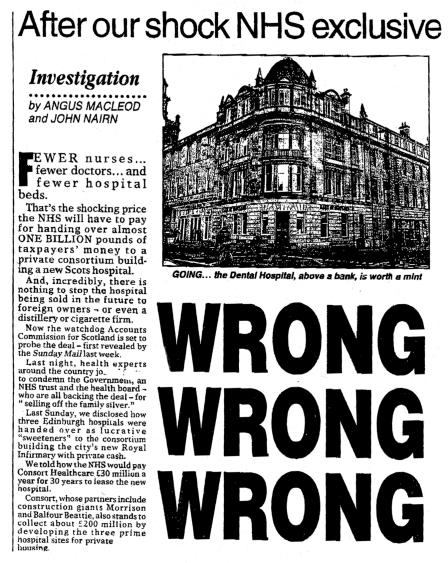Few ideas can be more assured to work the press into a lather than the notion of taxpayers’ hard earned money being used to swell the coffers of rich private conglomerates. And so it has proved to be with the issue of the private finance initiative (PFI)—a scheme introduced by the Conservative government and adopted by the present Labour administration, which involves private companies building hospitals and schools and then leasing them back to the state over a 20 or 30 year period. The buildings may never revert to public ownership, prompting the Scottish National Party (SNP) to dub PFI “Privatisation For Infinity.” It has become one of the most fiercely fought over issues in the election for the first Scottish parliament for 300 years, generating many column inches in the newspapers over the past few weeks.
The Scottish press has variously described the private finance initiative as “the only practical means of providing patients and staff with first class treatment facilities”; “a poor deal for taxpayers, who will pay huge sums for buildings they will never own”; “equivalent to arranging a mortgage through a loan shark,” and other, less flattering, definitions. The tabloid Scottish Sunday Mail led the charge against PFI in a series of articles which set out to expose the scandal of the scheme, as the newspaper saw it. The articles concentrated on the deal to build a replacement for the Edinburgh Royal Infirmary. The new hospital will cost £180m ($290m), but the NHS will pay an annual charge of £30m for 30 years to the private consortium that will build it—a total of £900 million. “Wrong, Wrong, Wrong” read one banner headline in the Scottish Sunday Mail.
The story was taken up by others newspapers, with the Herald, in particular, examining some of the implications of the Edinburgh PFI deal and not being too happy with what it found. It quoted an analysis carried out by a leading critic of PFI, Professor Allyson Pollock of University College, London, which concluded that staffing and bed numbers at the new Edinburgh Royal Infirmary would have to fall significantly to pay for the project. In a later letter to the newspaper Professor Pollock said the hospital trust would cut its operating costs by £31m a year by reducing staff, supplies, and NHS capital charges. However, £20m of this money would not benefit the NHS but “will be used to service the consortium’s bank debt and provide returns to shareholders,” she wrote.
The row over PFI then spilled over into the Scottish election. The BMA in Scotland wants PFI schemes abandoned, and the policy has been rejected by both the SNP and the Liberal Democrats. The SNP has proposed replacing the scheme with Scottish public service trusts, which would still use private investment for public buildings but retain them in public ownership.
The SNP has attacked Labour’s support of PFI and has been supplied with plenty of ammunition. Widespread coverage was given to the decision of a leading union official, Mark Irvine, to quit the Labour party over the issue and to subsequent critical comments from the party’s Scottish treasurer, Bob Thomson, that PFI was a bad deal for the taxpayer. Members of the public sector union, Unison, at the Edinburgh Royal Infirmary withdrew their support from Labour, and there was further embarrassment when it was revealed that a Labour election candidate, George McGregor, had likened PFI to “a mortgage from a loan shark” at a conference last year. Mr McGregor said he was speaking at the time on behalf of his union and these were not his personal views, but Labour’s otherwise assured election campaign was being undermined by continual bad publicity over PFI. 
During all this, the Scottish health minister, Sam Galbraith, has maintained that the critics of the scheme have got it wrong. The Edinburgh consortium is not being paid £900m to build a £180m hospital because the annual charges also cover running costs. “Let me make it clear that when PFI funding is used, it saves money for the taxpayer. It is not a hire purchase agreement. I repeat it is cheaper than the public sector option and where it is not, it is not permitted,” he said in the Scotsman. However, most of the Scottish papers later quoted a report by accountants Chantrey Vellacott DFK that estimated that, for every £1bn of spending financed by PFI, the Treasury paid £50m more in interest than if it had borrowed the money directly.
At a time when the mass media seems to be obsessed with personalities and human interest stories, the Scottish press deserves credit for devoting attention to this complex but important issue. Given the welter of claim and counter claim about PFI, it is difficult to know if the public has emerged any wiser. What is clear is that there is an instinctive reaction against a system that hands over such large amounts of money to private companies, and the advocates of PFI will have to work a lot harder to explain the supposed benefits if they are to convince people that such schemes are in the public interest.


